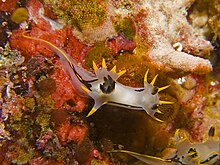The twin-crowned nudibranch, scientific name Polycera sp., as designated by Gosliner, 1987, is a species of dorid nudibranch. It is a marine gastropod mollusc in the family Polyceridae. As of November 2009, it was undescribed by science.
| Twin-crowned nudibranch Polycera sp. | |
|---|---|

| |
| A live individual of Polycera sp. in situ, with the edge of a second individual visible below it | |
| Scientific classification | |
| Kingdom: | |
| Phylum: | |
| Class: | |
| (unranked): | clade Heterobranchia
clade Euthyneura |
| Superfamily: | |
| Family: | |
| Subfamily: | |
| Genus: | |
| Binomial name | |
| Polycera sp. | |
Distribution
editThis species has been found off the southern African coast off the Cape Peninsula in False Bay and off Durban in 2–30 m.
Description
editThe twin-crowned nudibranch is a smooth-bodied variably coloured nudibranch. The ground colour is white or grey and there are usually black, yellow or orange stripes longitudinally along the notum, though these can be absent. The head has six yellow projections. The gills and rhinophores are black, and may be spotted with yellow. There are raised yellow spots on the mid-dorsal region. Alongside the gills are two or three pairs of yellow projections, which differentiate the animal from the crowned nudibranch and the fourline nudibranch. The animal may reach 30 mm in total length.[1] A study using DNA sequencing found that there were two species amongst specimens identified as P. capensis and this species was categorized as Polycera sp. A.[2]
Ecology
editThe egg ribbon of this species is a wavy white spiral collar.
References
edit- ^ Gosliner, T.M. 1987. Nudibranchs of Southern Africa ISBN 0-930118-13-8
- ^ Palomar, G.; Pola, M.; Garcia-Vazquez, E. (2013). First molecular phylogeny of the subfamily Polycerinae (Mollusca, Nudibranchia, Polyceridae). Helgoland Marine Research. 68(1): 143-153.